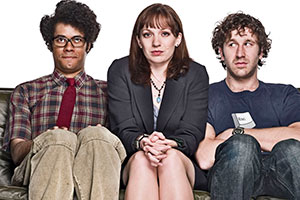Matt Berry interview
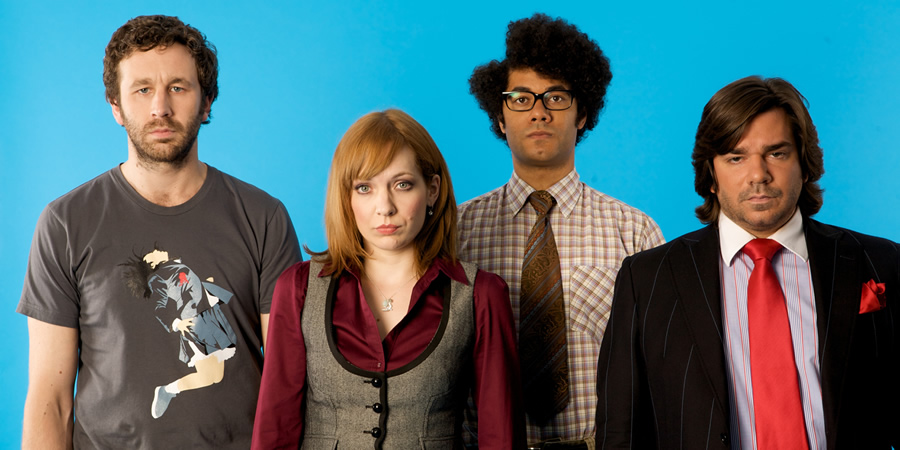
Matt Berry talks about playing Douglas Reynholm in the hit Channel 4 sitcom...
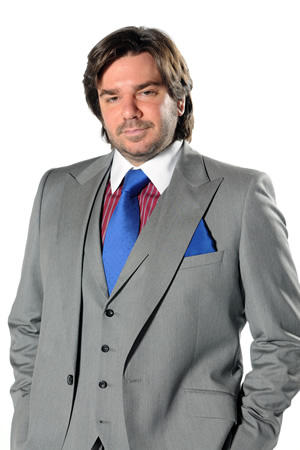
For anyone who doesn't know your character Douglas Reynholm, could you sum him up please...
Well, he inherited Reynholm Industries from his father (who was played by Chris Morris) after he killed himself and yeah, he's just taken over. He doesn't know anything about the company; he doesn't care either. He's like a Mark Thatcher sort of guy. He's just got a lot of power and a lot of money and he thinks its fun to run this sort of company. I guess he's a bit of a playboy and he's always getting sued but he just doesn't care - he's got plenty enough cash to get out of it.
What can you tell us about what's coming up for your character?
All I will say is there's a lot of love hassle in this one. He gets into a bit of trouble. And it goes to court. Douglas is in the dock.
What do you think it is about you that made Graham Linehan want to cast you as a very rich, carefree, sleazy playboy?
God knows, because I'm not at all like that. I've no idea. It seems like I always get cast as a boss but I'd be the worst boss in the world in real life.
So you're not a micro manager kind of guy?
I don't even know what that means.
Or a 'people person'?
Well yeah to an extent - in the pub, but I can't 'manage' anyone.
You've been on a fair few episodes and The IT Crowd is a very popular series. Do you get recognised?
It's great. I've got mates who do soaps and things but the coolest thing about doing comedy is when people do recognise you they smile straight away - because you remind them of something that's made them laugh. So it's always a good sort of reaction. Another thing that's interesting is, with the other things that I did I was mainly recognised by students and boys and girls in black t-shirts. From doing this show it's all ages and it's on the Tube. That's a good way of testing a show. If you get recognised on the Tube then you must be in something that's watched by a good few people. As opposed to being watched by five people, like the other things that I did.
Why do you think people warm to Douglas?
I guess people just enjoy watching someone being a dick, don't they? He's a heightened version of someone that they might know. And if you look as if you don't care about anything it's always quite funny.
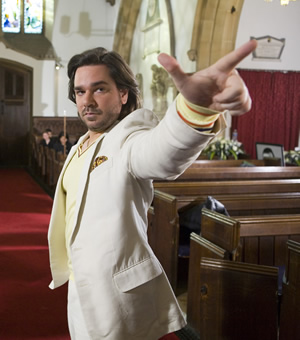
Have you had any real-life IT moments?
Oh yeah, that's happened. It happened in the Orange Shop. I wanted to change to an iPhone and I had my other phone and I could tell as soon as I went in he was like, "it's him." I explained what I wanted and I always make an effort not to sound like I know what I'm talking about so they don't say anything IT Crowd related. But he went, "I don't have to tell you how any of this works, I'm sure." I said, "No, no mate. Seriously like, I don't know anything about this. It's just an acting job; do you know what I mean? I don't know anything about IT at all." I think by the way I was dressed - not in a suit and tie - it all made sense in the end.
You've worked with Richard Ayoade before...
Yeah. I did Garth Marenghi's Darkplace and I wrote a rock opera with him called ADBC. We've also both done The Mighty Boosh. It's always good doing stuff with him, because I started with him. We were doing stand up in the Hen and Chickens pub on Highbury Corner on the Boosh nights and that's basically how I met Mat [Holness] and Rich and then we did Darkplace.
Do you know what IT means?
'Information Technology'? Well it's going to be 'technology', right? I don't know what the 'I' stands for.
And have you picked up any technical knowledge whilst working on the show?
No. Douglas's IT interaction is sort of zero really. Moss and Roy do the IT jokes. The only thing I did was ask Roy to turn my laptop on one episode - where you have to lift the lid.
You film in front of a studio audience. How is that?
Well it's good in a lot of ways because you get to know within a fraction of a second whether the joke works or not, and how you should tailor what you've just done from the audience reaction. Whereas if you do something on location there's no way of knowing. Actually I love doing both. I love doing single camera out and about and I love working in front of a studio audience. Because with a joke you can never tell - the thing that you reckon is going to really do it will be the thing that half does and then something you think is alright goes mental.
Can you give us an example of something that went down better than you expected...
There are loads. Like the electric sex pants thing, I'd done that in rehearsal and it was alright, and then that seemed to go down really well live. It's weird how some things get people's attention and others don't.
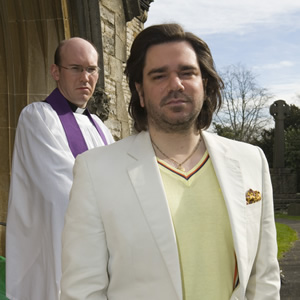
Have you seen any of the international versions with yourself dubbed?
No. I wouldn't do that. It'd be weird, wouldn't it?
And do you get a lot of fan mail from IT departments around the world?
Well again no because I'm not really anything to do with the IT department. I'm just the horrible, sleazy boss upstairs. I have had some weird things. I think some of the craziest stuff has been fashion students wanting to do something on Douglas as part of their show or their collection, something based on his particular look which is quite strange. They were saying 'where did you get the idea from and do you mind if we copy it?' And it's like, 'Well you do know he's supposed to look like a fool?' They get their inspiration from all kinds of things, I guess.
Why do some sitcoms work and others not, would you say?
You have to have a decent cage. By that I mean whatever contraption that your main characters are stuck in, whether it is Del Boy's flat, whether it is prison as with Porridge or the priests' home in Father Ted. An IT department in an office is just another good cage I think and that really helps. If you get that right, your cage where people can come in and out, then your characters can be really funny within it.
Do you think a sitcom like this gets better after a few series? You've mentioned Only Fools and Horses, which is probably a classic example of one that did...
Plus Blackadder, yeah. I think it takes one series to suss something out because by the time you've got to the end of the first series you'll know what to do and what not, and that's really important. So if you scrap a show after the first series it's really unfair. People are quick to say, "This is rubbish," and then that's it. The first series of Blackadder, that would never have got a second series now.

